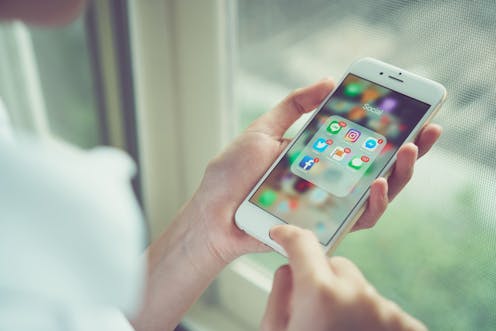Why social media are more like chocolate than cigarettes
- Written by Babak Abedin, Senior Lecturer, University of Technology Sydney, University of Technology Sydney

Twitter CEO Jack Dorsey took to the social platform last week to announce a call-out for ideas about how to measure the health of online conversations. The initiative follows recent demands for government to regulate the negative consequences of social media.
Discussing the possibility of such regulations in January, Salesforce CEO Marc Benioff compared social media with the tobacco industry, saying:
I think that you do it exactly the same way that you regulated the cigarette industry. Here’s a product: cigarettes. They’re addictive, they’re not good for you.
However, our research suggests that social media are more like a chocolate than a cigarette – it can be healthy or unhealthy depending on how you use it. While health ratings make no sense for cigarettes, they do help consumers make informed decisions about the level of sugar, oil and other additives they want to consume when buying particular chocolate products.
Read more: Why social media apps should be in your disaster kit
Social platforms under fire
Twitter’s planned “health metrics” will measure the civility of public conversation, which Dorsey admits is poor on Twitter. He told users:
We have witnessed abuse, harassment, troll armies, manipulation through bots and human-coordination, misinformation campaigns, and increasingly divisive echo chambers. We aren’t proud of how people have taken advantage of our service, or our inability to address it fast enough.
The metrics, based on research by the MIT Media Lab’s Laboratory for Social Machines, will gauge:
- shared attention: is there overlap in what we are talking about?
- shared reality: are we using the same facts?
- variety: are we exposed to different opinions grounded in shared reality?
- receptivity: are we open, civil and listening to different opinions?
It sounds like a step toward responsible computing, but Twitter isn’t the only platform dealing with these issues. Recent online incidents have heated up the debate about the negative effects of both YouTube and Facebook.
Late last year, YouTube Kids failed to filter disturbing videos in which popular characters kill or torture each other. Facebook admitted that its platform can be bad for its users’ mental health. There was also a sharp increase in cyber-bullying against teens in Australia in 2017, with a recent report revealing a 63% increase in violent threats and revenge porn.
So how seriously should we take these issues? And where is the line between healthy and unhealthy use of social media?
Social media can be good for well-being
The inherent potential of social media is that it allows us to connect. We keep in touch with family and friends, reach out to favourite brands, share our views and feelings with the world, and stay up-to-date with news and events.
Some people go further and use social media for self-development and empowering others. In 2014 and 2015 we interviewed 25 ovarian cancer patients, followed by a survey of another 150 to ascertain the impact of specialised social media groups on patients. We learned that some cancer patients use moderated Facebook groups to share information and experiences with like-minded people, which considerably improved their psychological well-being.
Read more: How social media can make life better for young people in care
In 2016, we examined past studies and interviewed a number of experts in the aged care industry. We found that social media can help older people to tackle isolation and loneliness, connect with their community, and even generate income through reaching out to new markets.
Our analysis of social media posts about natural disasters in Australia also showed that many people use Twitter to stay updated about bushfires and flooding alerts, and to post relevant pictures and news to help members of their community.
Adverse impacts
We also conducted an extensive review of past studies on the impacts of social media applications on users, and discovered various negative effects. These include feelings of stress, depression, jealousy and loneliness, as well as reduced self-esteem and life satisfaction, and violations of privacy and safety.
We found that while some users are conscious of developing negative feelings through using particular social media platforms, others may be unaware of such adverse effects until their psychological health deteriorates. These negative experiences can hurt our well-being, and in some cases may lead to extreme consequences, such as harming others or suicide.
Read more: Constantly texting your friends about problems may be increasing your anxiety
How to ensure your usage is healthy
A healthy habit of using any social media platform involves asking ourselves what values we expect from our online engagements. We need to be cautious whether such engagements will create positive or negative outcomes for us, or for the people we interact with.
We recommend:
Educating yourself about risks of using social media platforms and making yourself aware of safety recommendations. The Office of the eSafety Commissioner actively posts educational articles informing Australians about risks of – as well as strategies for – using social media and internet platforms.
Being mindful of private information you share about yourself or others on social media. Consider how you might feel if what you’re sharing was exposed to a third party. Assume that your conversations will be preserved.
Trying not to become penned in by algorithmic decision-making. Place less trust in recommendations and actively venture beyond the content served up on your screen.
Supervising your children. Take advantage of features tech companies offer for parental guidance, but don’t stop there. Actively monitor your children’s online activities and connections.
Authors: Babak Abedin, Senior Lecturer, University of Technology Sydney, University of Technology Sydney
Read more http://theconversation.com/why-social-media-are-more-like-chocolate-than-cigarettes-91330




